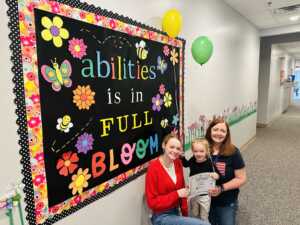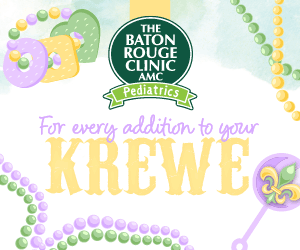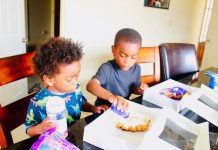It takes a village, right?
 I always assumed our village would include family, friends, neighbors, teachers, and Sunday School teachers. Expectations and reality … how they rarely ever align.
I always assumed our village would include family, friends, neighbors, teachers, and Sunday School teachers. Expectations and reality … how they rarely ever align.
Two out of three of my daughters had eating issues. My oldest had a severe allergy (that she did eventually outgrow) which prevented her from eating rice, bananas, wheat, and oats. A trip to the ER with a limp six-month-old is something you never want to repeat again. Helicopter parenting was not my preference, but was mandatory with an FPIES baby. After two years of seeing Dr. Sandhya Dev Mani, MD, a pediatric allergist at Our Lady of the Lake, my daughter was cleared to eat a normal diet, without restriction. It was a humbling experience. Allergy moms out there, I really respect you. And should I be able to get it together well enough for Halloween, there will always be a teal pumpkin with non-allergen treats at my house.
And then there was my little middle, who never really got the hang of eating solid foods. At all. When she was a baby, we clung to formula a little longer than we normally would have. Baby food feedings were miserable. It was basically like signing up for a stressful meltdown (both baby and mommy), without any sign of success. Because I was pregnant with her future roommate, the issue got put on the back-burner. Oh, the things that slip through the cracks when raising multiple children.
So with a two-week-old sister in tow, it was recommended that we seek out a feeding specialist. Margaret Reed, CCC, SLP, a speech therapist at Abilities Pediatric Therapy Services, was kind, reassuring, and pinpointed my daughter’s issues within about three minutes. “Forward tongue thruster” is apparently a thing, and therapy was needed to get my adorable one-year-old to eat.
A few weeks later, she was eating. Again, very humbling. And SUCH a relief as my little middle had gotten a little too itty-bitty.
Fast forward to a year and a half later, my daughter was still struggling to eat. More than just “picky”, she basically declined calories in the form of solid food. She was completely disinterested and uncooperative when it came to mealtimes. Dinner was especially dreaded. Milk was her lifeline. It was not normal, and it was time to go to the “eating teacher” again.
What seemed like defiant child behavior turned out to be weak jaw muscles, poor chewing coordination, and sensitivity to texture. Again, it was actually a thing. Friday mornings became “eating teacher” time where my child got the undivided attention she would have never gotten at home (thanks, sisters) with structured interventions and strategies that I could have never dreamed up. Slowly but surely, my daughter’s eating improved. I no longer worried about her calorie count for the day. Eventually, it was normal to see her eating her breakfast. She did not struggle when she chewed. She finally embraced eating roast and vegetables, a staple in our household. I am happy to report that now she does eat dinner, even if she is tired and ready to relax at the end of the day. Seems basic, but it is a major victory for our family. If you know, you know.
Sometimes you do not know what is missing in your village until you have it. We are very grateful to Dr. Mani, Ms. Margaret, and Abilities Pediatric Therapy Services. At our daughter’s final session, there were balloons. Hooray for our Village!
















